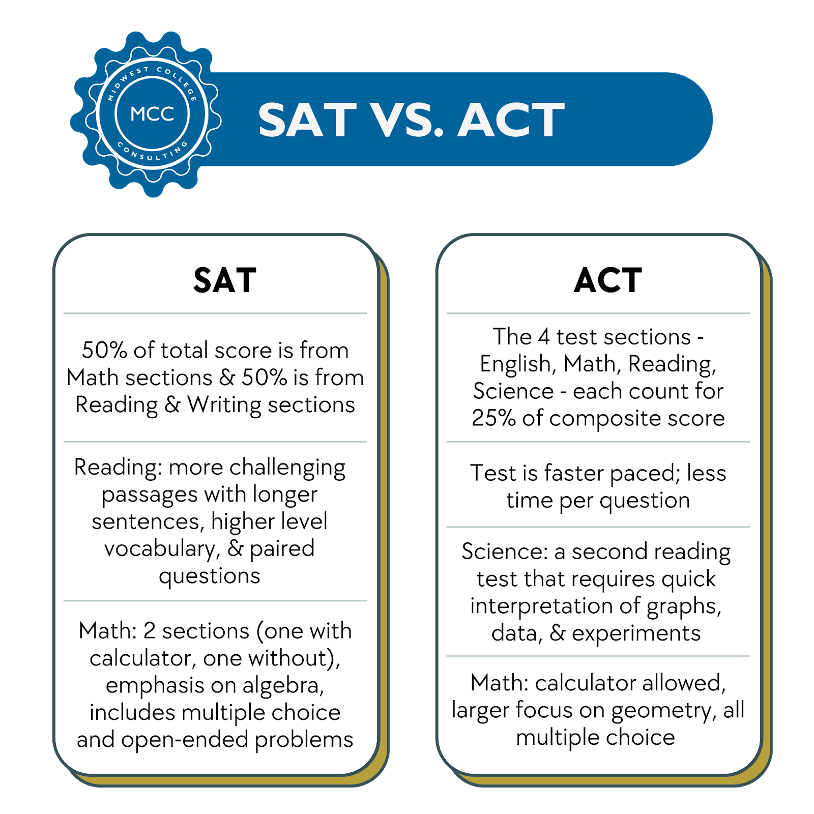TEST OPTIONAL
Nearly all colleges adopted a test-optional policy during the pandemic, and most remained test optional for the class of 2023. Some schools were test-optional before Covid as well. However, test-optional does not mean you shouldn’t test or send scores. Some colleges are returning to pre-pandemic testing requirements, including MIT, Purdue, Georgetown, and many large state universities in the South, including the University of Tennessee, the University of Georgia, and all Florida public colleges. We recommend all students prepare for the ACT or SAT and take it more than once. Once your testing is complete, compare those results to the policies and admitted student profiles of your colleges. If your scores fall within the middle 50% of accepted students, it usually makes sense to submit them. If you don’t do as well as you hope, the good news is there will be plenty of colleges to which you can apply without scores.
TEST PREP
MCC is extremely fortunate to have test prep expert Kelley Ching on our team. Kelley has prepared students virtually and in person for the ACT, SAT, and PSAT for over 25 years. She takes a highly personalized approach with each student and devises a plan to meet their individual needs and score goals. Kelley earned her master’s degree in education from Stanford University and her BA from UC Berkeley. Kelley’s teaching background and tutoring experience distinguish her from many independent tutors and test prep agencies. Email kelley@midwestcollegeconsulting.com or your consultant to inquire about her availability.
We recommend test prep before all tests, including the first one. Learning math and grammar content, in addition to strategies for the various sections, is important. It can be helpful to take a timed practice test at home or a proctored/timed practice test for a benchmark score before you begin your prep. Timed practice tests as part of test preparation are critical to preparing for the ACT and SAT. You can find them online or in the study guides.
This ACT study guide is the standard resource many tutors use and is also great for independent studying. Amazon link: The Official ACT Prep Guide. For SAT tests through 2023: The Official SAT Study Guide.
WHEN TO TEST
The ideal testing time frame depends on many factors, including your coursework and commitments outside of school/availability for test prep. For students who have completed Algebra II, it often makes sense to prepare over the summer before junior year and take the first test in July or September. Once those results are available, you can reassess to determine your additional test prep needs and choose retesting dates. If your summer is too busy to devote time to test prep, you can prepare in early fall and take the first test in December. As you plan, also keep in mind that many high schools offer a free ACT or SAT during the school day in February, March, or April.
For specific test dates, you can pay to receive the questions/answers after your test to use for future preparation. We recommend paying the additional fee if offered on your testing date: April, June, and September for the ACT; October, March, and May for the SAT. Please double-check these dates because changes are underway.
An additional factor to consider is that the College Board announced that the SAT is switching from a paper/pencil test to a digital adaptive version. Administrations of the paper test will only be available through the end of 2023. The 2023 PSAT will be administered in the new digital format and may be a good indicator of whether this version is a good fit for you. For more information about the digital SAT, click here.
WHICH TEST?
While colleges view the ACT and SAT equally, many students prefer one over the other. The choice should be deliberate based on the student’s strengths and preferences. Test prep should focus on either the ACT or SAT, and students should devote their energy towards improvement on that specific test.
REGISTERING
Plan and register ahead of time! The longer you wait to register, the fewer locations might be available for testing.
Use your proper name if you have a nickname. Your name should match the name on your high school transcript.
During registration, you will be asked to answer many questions for your profile. Many of these questions concern your high school courses, grades, and prospective academic area of interest. You are not required to complete most of these questions. If you decide to enter grades, do so only for A's.
The SAT eliminated its optional essay section, and most colleges have stopped considering the optional ACT writing section. When registering for the ACT, you can decline to sign up for the optional writing portion unless you are applying to West Point (where as of 2023, it is required).
AT MCC WE ADVISE STUDENTS NOT TO SEND FREE SCORES TO ANY COLLEGES AT REGISTRATION OR TESTING TIME. Based on the policies of your colleges and whether or not your scores will benefit your application, you can determine which scores to send to which colleges once your testing is complete.
LEARNING DISABILITIES/EXTENDED TIME: If you have a diagnosed LD or health condition with a 504 or IEP, you should request testing accommodations from the College Board and ACT. The process takes time, and a school official must submit the request for accommodations before the late registration deadline for the test (even if a student already receives accommodations at school). Requests can take 5-10 days to process, so don’t delay the accommodations process. In nearly all cases, the College Board and ACT will approve extended time/accommodations only if a plan is already in place and the student is actively using it at school. NOTE: Military Academies do NOT accept scores taken with accommodations.

